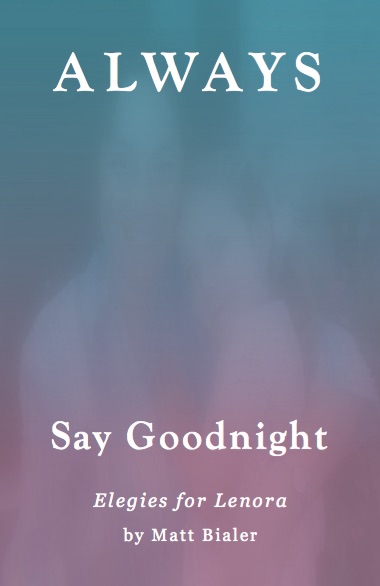
|
|
|
|
|
| Issue 2: | March 2020 |
| Review: | 396 words |
By Eamon Grennan
An Object of Wonder: Always Say Goodnight
by Matt Bialer

KYSO Flash Press |
Few collections feel as urgent as Matt Bialer’s remarkable new book, Always Say Goodnight. Although its subject is the dying and death of the poet’s beloved wife of 26 years, the deeper effect of this extended elegy is to awaken us to the realities, the daily joys and ordinary complications of married love and parenthood, and the hard facts of catastrophic illness: its hopes and fears over the long haul, and its out-of-the blue deteriorations.
With its narrow-lined verse construction, each long poem becomes—formally—a startlingly free yet deftly composed jazz riff, replete with speedy repetitions, surprising tangents, sharply controlled swerves between grief and memory, joy and unspeakable distress. The hard medical facts are laid out beside emotions and memories that test and test again the poet’s simple wish to say, to speak, to survive, and to go on speaking to that unique, essential yet tragically absent “you.”
As well as being a poet, Bialer is both a painter of vivid watercolors and a sharply evocative, patient practitioner of black and white street photography. The qualities and virtues of both arts (lyrical celebration of natural landscapes; factual recording of intimate, ordinary, everyday city scenes) find their own telling way into these poems, into this celebratory, unafraid-of-facts, rhythmically compelling elegiac sequence. Read it slowly, piece by piece: its tenderly detailed honesties may break your heart.
The effects of this plangently evocative Always Say Goodnight are cumulative, so no extracted quotation will do it justice. Still, I cannot help but quote the last few lines of the last poem—a simple memory, but shining and abiding and brilliantly there. His wife, less than a year before her death, is taking her last kayak ride:
You wink
and start to paddle away...
I watch you paddle
past a little family of ducks
You paddle with the current
I can see you
regarding everything
The sky
The clouds
The expanse of water
A miracle.
Isn’t this what love and poetry can do? The ordinary, always endangered world becoming miraculous, and all being taken in both by departing wife, and spellbound husband. Such a word to end such a sequence on! Miracle. Yes; and see Miracle pop out of your dictionary as an object of wonder, something to wonder at, and simply—like this admirable, moving, entirely memorable collection—wonderful.
Eamon Grennan
is an Irish poet who was born in Dublin in 1940 and has lived in the United States, except for brief periods in western Ireland, since 1964. He earned his Ph.D. at Harvard and was the Dexter M. Ferry Jr. Professor of English at Vassar College until his retirement in 2004. He began writing poetry in earnest in 1977 and published his first collection, Wildly for Days, in 1983. He is the author of more than 10 collections of poetry, including There Now (2016), Out of Sight: New and Selected Poems (2010), Matter of Fact (2008), The Quick of It (2005), Still Life with Waterfall (2002), and Relations: New and Selected Poems (1998).
Grennan has also written a book of essays, Facing the Music: Irish Poetry in the 20th Century (1999). He won the PEN Award for poetry in translation for Selected Poems of Giacomo Leopardi (1997), and the Lenore Marshall Poetry Prize from the Academy of American Poets for Still Life with Waterfall (2002). He has won several Pushcart Prizes, and has received fellowships from the National Endowment for the Arts, the National Endowment for the Humanities, and the Guggenheim Foundation.
| Copyright © 2019-2025 by MacQueen’s Quinterly and by those whose works appear here. | |
| Logo and website designed and built by Clare MacQueen; copyrighted © 2019-2025. | |
|
Data collection, storage, assimilation, or interpretation of this publication, in whole or in part, for the purpose of AI training are expressly forbidden, no exceptions. |
At MacQ, we take your privacy seriously. We do not collect, sell, rent, or exchange your name and email address, or any other information about you, to third parties for marketing purposes. When you contact us, we will use your name and email address only in order to respond to your questions, comments, etc.